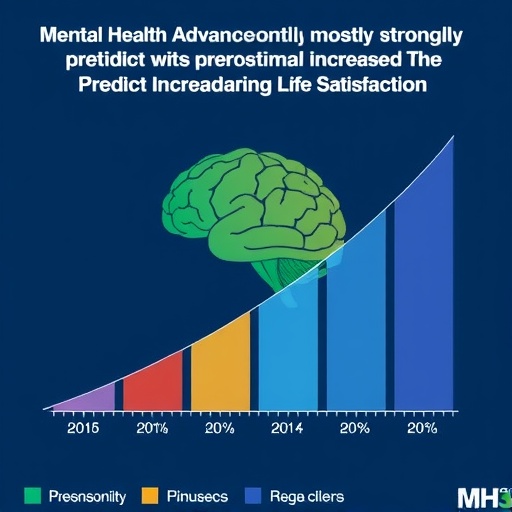In a groundbreaking study published in PLOS Global Public Health on October 2, 2025, researchers led by Steve Haake from Sheffield Hallam University have unveiled a novel model for assessing life satisfaction that emphasizes the profound impact of mental health improvements. By analyzing data from participants of a weekly 5-kilometer running event, known as Parkrun, this research sheds new light on how communal physical activities translate into enhanced well-being, particularly through mental health pathways.
Life satisfaction, a subjective measure of overall contentment with life, is influenced by a myriad of factors ranging from personality traits to fluctuating external conditions such as economic stability and relationship dynamics. The study, situated in the UK where average life satisfaction scores hover around 7.5 on a 0-10 scale, delves deeper into the mutable components that can lead to shifts in life satisfaction over time. While personality remains the dominant determinant, variables such as health and social engagement were systematically explored in this extensive observational research.
The cohort for this study consisted of over 78,000 individuals participating in Parkrun events, a free, community-driven initiative promoting weekly exercise and social interaction. Participants responded to a comprehensive survey examining their general life satisfaction alongside health status and activity levels before and throughout their involvement in Parkrun. This rich dataset was then matched against the broader participant pool of nearly one million people who completed at least one Parkrun event in the preceding year, creating a robust foundation for modeling life satisfaction dynamics.
One of the most striking findings from the analysis is the central role that perceived improvements in health status play in elevating life satisfaction. Notably, participants who initially reported “very bad” health experienced the most pronounced boosts in life satisfaction, suggesting a significant capacity for positive change when individuals engage in sustained physical activity within a community context. This reveals an important dimension for public health strategies targeting populations with poor baseline health.
Contrasting the physical health dimension, the researchers highlight that mental health indicators—capturing feelings of happiness, well-being, personal achievement, and enjoyment—emerged as the strongest predictors of rising life satisfaction among participants. This nuance underscores the complex interplay between mind and body in well-being and suggests that the psychological uplift derived from participation and achievement in Parkrun may outweigh mere physical health gains in driving life satisfaction.
Further demographic analysis revealed that life satisfaction’s relationship with age follows a non-linear pattern, typically dipping in early middle age and recovering in the later years of life. Interestingly, older participants and women reported greater improvements in life satisfaction compared to younger individuals and men, indicating potential gender and age-related nuances in how communal physical activities affect well-being.
From an economic perspective, the study also quantifies the substantial financial benefits Parkrun contributes to the UK economy, estimating an impressive total of £668 million. This valuation incorporates direct effects such as the number of runs completed (£75 million), increased activity levels attributed to participation (£132 million), and a previously established 3% improvement in health status (£463 million). These figures suggest that initiatives like Parkrun are not only socially beneficial but also economically viable public health interventions.
The significance of this research extends beyond mere statistics; the novel model proposed for evaluating life satisfaction changes offers a versatile tool that can be applied to various public health initiatives—not exclusively those targeting physical health. By distinguishing which elements contribute most effectively to life satisfaction, policymakers can prioritize programs with highest impact in resource-constrained settings.
Importantly, the authors clarify that the observed effects are not solely physical but deeply psychological. The cumulative joy, sense of achievement, and fun derived from regular participation are identified as critical drivers. This fresh perspective challenges traditional views that physical health improvements are the predominant benefits of such activities.
The survey funding and data collection were supported by parkrun Global but were conducted independently of parkrun’s organizational influence, ensuring scientific integrity and objectivity of the findings. The principal and co-investigators took care to dissociate the design, analysis, and reporting processes from any potential conflicts of interest tied to the parkrun organization.
This study, employing rigorous observational methodologies, responds to an essential question raised in prior research: how exactly does an initiative like Parkrun enhance life satisfaction? It conclusively demonstrates that mental health is the linchpin of these improvements, a discovery that could reshape the design of community health programs globally.
By advancing a scalable, evidence-based model of life satisfaction, Haake’s team provides a critical framework for public health that prioritizes mental well-being within physical activity programs, promoting not only healthier bodies but more fulfilled minds. As societies grapple with rising mental health challenges, such insights offer hopeful pathways toward holistic wellness strategies.
For readers and policymakers alike, this research highlights the potent benefits of integrating communal physical activities with a targeted focus on mental health enhancement. Parkrun’s success offers a replicable template for fostering resilient communities where life satisfaction can flourish through shared, enjoyable experiences that boost both physical and psychological well-being.
Subject of Research: People
Article Title: A generic model of life satisfaction: The case study of parkrun
News Publication Date: 2-Oct-2025
Web References: http://dx.doi.org/10.1371/journal.pgph.0005065
References: Haake S, Hext A, Benkowitz C (2025) A generic model of life satisfaction: The case study of parkrun. PLOS Global Public Health 5(10): e0005065.
Image Credits: Steve Haake, CC-BY 4.0
Keywords: life satisfaction, mental health, physical activity, Parkrun, community health, public health model, observational study, well-being, economic impact, happiness, personal achievement, physical health




